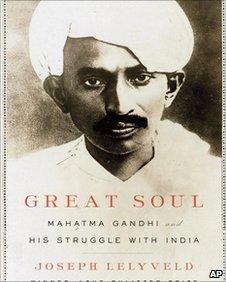Writer says Gandhi book ban 'shameful'
- Published

The book has been widely reviewed but is yet to be released in India
The author of a book on Mahatma Gandhi has said it is "shameful" that it has been banned in India's western state of Gujarat.
Pulitzer Prize-winning author Joseph Lelyveld said the book was banned on the basis of newspaper reviews.
He said the reviews had sensationalised his account of Gandhi's friendship with a German man, who may have been homosexual.
Although legal, homosexuality still carries a stigma in India.
Gujarat's state assembly voted unanimously on Wednesday to ban Great Soul: Mahatma Gandhi and His Struggle With India with immediate effect, even though it has not yet been released in India and few people will have read it.
"In a country (India) that calls itself a democracy, it is shameful to ban a book that no one has read, including the people who are doing the banning," Mr Lelyveld was quoted as saying by the Press Trust of India news agency.
'Extreme step'
"They should at least make an effort to see the pages that they think offend them before they take such an extreme step. I find it very discouraging to think that India would so limit discussion," he said.
Indian writers and relatives of Mahatma Gandhi have protested against the ban.
Gandhi's great grandson Tushar Gandhi said he was against banning of books, and that it did not matter "if the Mahatma was straight, gay or bisexual".
"Every time he would still be the man who led India to freedom".
Writer Namita Gokhale said she was saddened by the ban.
"Every time a book is banned, it saddens me because you simply cannot ban ideas, you cannot ban thoughts." she said.
"In India a democratic space for ideas is a gift and I think banning a book is the most pointless exercise."
Mr Lelyveld has denied writing that Gandhi was a bisexual, saying his work had been taken out of context.
"I do not allege that Gandhi is a racist or bisexual in Great Soul," he told the Times of India.
"The word 'bisexual' nowhere appears in the book."
However reviews of the book give detailed comment on its coverage of his alleged affair with Hermann Kallenbach - a German architect, who emigrated to South Africa, where he met Gandhi in 1904.
"How completely you have taken possession of my body," reads one widely quoted letter from Gandhi to Mr Kallenbach in the book. "This is slavery with a vengeance."
Gujarat Chief Minister Narendra Modi said that contents of the book were "perverse and defamed the icon of non-violence".